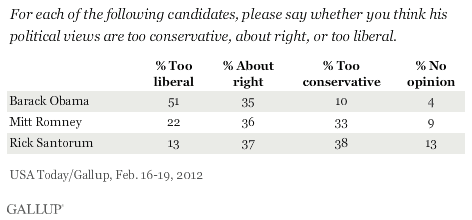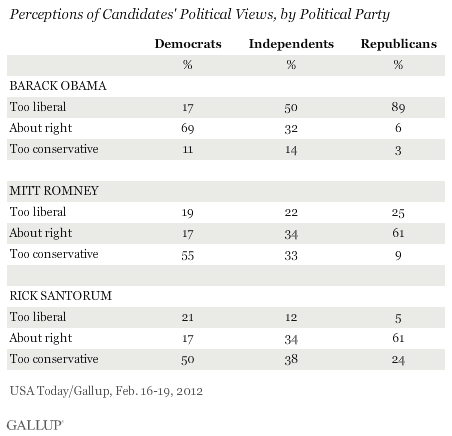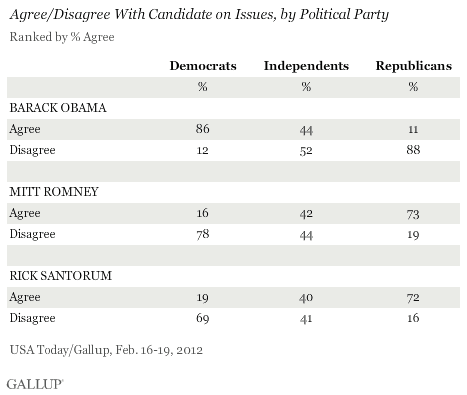PRINCETON, NJ -- A slim majority of Americans, 51%, say Barack Obama's political views are "too liberal," a greater percentage than believe either of his main Republican challengers -- Rick Santorum (38%) or Mitt Romney (33%) -- is "too conservative." Americans are about equally as likely to say the views of Romney and Santorum are too conservative as "about right." Slightly more say Romney's views are too liberal than say this about Santorum.

Notably, the percentage of Americans who say each candidate's views are "about right" is nearly identical in the Feb. 16-19 poll.
Americans' perceptions of Obama's ideology have changed significantly since he was elected. Four years ago, when Gallup first asked this question about Obama while he was competing for the 2008 Democratic presidential nomination, a plurality, 47%, thought his views were about right. At that time, 37% said his views were too liberal, compared with today's 51%.
The perceptions that Obama is too extreme to the left of the ideological spectrum than his competitors are to the right are likely due to three factors. First, Americans are more familiar with Obama than with either of his challengers, as evidenced by the smaller percentage without an opinion of Obama's political views (4%) compared with Romney's (9%) or Santorum's (13%).
Second, for many years Americans have been roughly twice as likely to self-identify as conservative rather than liberal. Thus, the odds are probably greater that a Democratic politician would be perceived as too liberal than that a Republican candidate would be perceived as too conservative.
Third, Republicans overwhelmingly believe Obama is too liberal (89%), while Democrats show far less consensus as to whether Romney (55%) and Santorum (50%) are too conservative.
Also, independents are much more likely to perceive Obama as being too liberal (50%) than to perceive either Republican as being too conservative.
Sixty-nine percent of Democrats say Obama's views are about right, slightly more than the 61% of Republicans who say the same about both Romney and Santorum. Republicans do diverge in their views of the rivals for their party's nomination, though, with 25% saying Romney is too liberal (compared with 5% for Santorum), and 24% saying Santorum is too conservative (compared with 9% for Romney).

Americans No Less Likely to Say They Agree With Obama on Issues
Although Americans tend to perceive Obama as too far to the left, when asked whether they agree or disagree with him on the issues they care about, they score him similarly to the Republican presidential candidates.
Specifically, 47% of Americans say they agree with Obama on the issues and 50% say they disagree. That -3 net difference is not statistically different from the scores of 0 for Santorum (42% agree, 42% disagree) and -5 for Romney (42% agree, 47% disagree).
![Please tell me whether you agree or disagree with -- [RANDOM ORDER] -- on the issues that matter most to you. February 2012](http://content.gallup.com/origin/gallupinc/GallupSpaces/Production/Cms/POLL/jbix3kewle2mssxxnlguga.gif)
Obama's greater familiarity to Americans is underscored by the fact that he gets the highest percentage who say they agree with him (47%) and the highest percentage who disagree with him (50%) among the three main presidential contenders.
For all candidates, the patterns in response by party are similar. Those who support the candidate's party overwhelmingly say they agree with him on the issues, and those who do not support his party disagree. Independents tend to express greater disagreement than agreement with all three candidates, with a slightly larger gap for Obama, likely resulting from greater familiarity with him.
Though Republicans' perceptions of Romney's and Santorum's ideology differ, they are equally likely to say they agree with each -- 73% for Romney and 72% for Santorum.

Implications
Americans' views of Obama's ideology have changed significantly since the 2008 campaign, with the majority now seeing him as too liberal. That shift probably is a result of Americans' greater familiarity with his issue positions as well as his policies over the last several years.
Currently, Americans are less likely to perceive either of Obama's likely Republican general election opponents as too conservative; however, that could change as they campaign and become more familiar to the public. That could especially be the case with Santorum, who is the least well-known of the candidates and has taken conservative positions on moral values issues, among others.
It may be seen as an advantage for the GOP that Americans perceive the main Republican candidates as being less extreme to the right than Obama is to the left. But that may not matter as long as Americans continue to be about as likely to say they agree with Obama as the Republicans on the issues they care about.
Indeed, the 2012 general election contest remains highly competitive, with Obama in statistical ties with both Romney and Santorum among registered voters.
Survey Methods
Results for this USA Today/Gallup poll are based on telephone interviews conducted Feb. 16-19, 2012, with a random sample of 1,014 adults, aged 18 and older, living in all 50 U.S. states and the District of Columbia.
For results based on the total sample of national adults, one can say with 95% confidence that the maximum margin of sampling error is ±4 percentage points.
Interviews are conducted with respondents on landline telephones and cellular phones, with interviews conducted in Spanish for respondents who are primarily Spanish-speaking. Each sample includes a minimum quota of 400 cell phone respondents and 600 landline respondents per 1,000 national adults, with additional minimum quotas among landline respondents by region. Landline telephone numbers are chosen at random among listed telephone numbers. Cell phone numbers are selected using random-digit-dial methods. Landline respondents are chosen at random within each household on the basis of which member had the most recent birthday.
Samples are weighted by gender, age, race, Hispanic ethnicity, education, region, adults in the household, and phone status (cell phone only/landline only/both, cell phone mostly, and having an unlisted landline number). Demographic weighting targets are based on the March 2011 Current Population Survey figures for the aged 18 and older non-institutionalized population living in U.S. telephone households. All reported margins of sampling error include the computed design effects for weighting and sample design.
In addition to sampling error, question wording and practical difficulties in conducting surveys can introduce error or bias into the findings of public opinion polls.
View methodology, full question results, and trend data.
For more details on Gallup's polling methodology, visit www.gallup.com.
